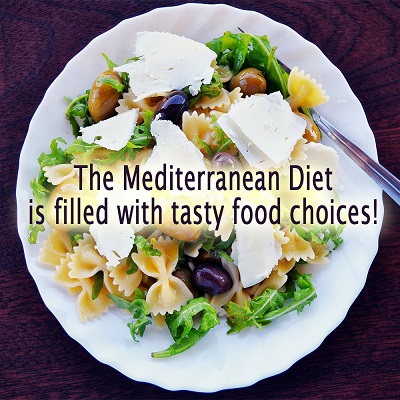 You may be looking for a list of Mediterranean diet foods you can use to create delicious, mouth-watering recipes. Below we have listed some of the most popular foods you can use when following this healthy lifestyle diet.
You may be looking for a list of Mediterranean diet foods you can use to create delicious, mouth-watering recipes. Below we have listed some of the most popular foods you can use when following this healthy lifestyle diet.
Olives & Olive Oil
Olives and olive oil are cornerstones of the Mediterranean diet. Aim for at least 4 servings of olives or olive oil in a day. One serving is one teaspoon of olive oil or 5 olives. Use olive oil to replace your butter, salad dressings, and margarine.
Fruits
All fruits are excellent sources of antioxidants, fiber, minerals, and vitamins. Enjoy eating at least ½ cup to 1 cup of these fruits daily. Here are a few examples:
Apples, bananas, avocado, and grapes. Stone fruits such as peaches, plums, and apricots. Citrus fruits such as lemons, limes and oranges. Berries such as blackberries, blueberries and strawberries.
There are many other fruits you can include, but as you can see there are many delicious fruits you can choose from.
Vegetables
We all know that vegetables are low in fat and calories, and high in fiber. You can eat them raw, roasted, sautéed with a healthy oil (like extra-virgin olive oil), or steamed. Like fruits, consume at least ½ to 1 cup of these vegetables daily.
Here are just a few examples:
Green leafy vegetables such as kale, spinach, cabbage, Swiss chard, collard greens, and lettuce. Bulb veggies include onions, leeks, chives, and garlic. Root vegetables include beets, carrots, and sweet potatoes.
There are of course many other vegetables you can include, such as asparagus, mushrooms, and tomatoes. This list just keeps growing!
Legumes
These are your plant-based proteins and sources of many other essential nutrients. They are low-fat, cholesterol-free foods. You may consume three half-cup portions per week of these beneficial foods.
Here are some examples:
Beans – like fava, cannellini, kidney beans, and the white varieties can be added to soups and salads.
Chickpeas – are full of fiber and protein and contain vitamin K, manganese, calcium, zinc, phosphate, and iron.
Lentils – can be tossed into salads and made into soups.
Peas – can be combined with pasta or soups.
Nuts and Seeds
These foods are excellent sources of healthy fat, fiber, protein, vitamins, and minerals. You can enjoy eating 3 helpings a week equivalent to about ¾ cup or 2 tablespoons of unsweetened, raw, roasted, or unsalted nuts and seeds.
Regulate your body weight and burn your energy by eating almonds, cashew nuts, hazelnuts, macadamia, peanuts, pistachios, walnuts, pumpkin seeds, sesame, and sunflower seeds.
Healthy Fats
Healthy fats are used regularly in the Mediterranean diet. Keep away from saturated fats and trans fats. Add 1 to 4 tablespoons only of the good oils.
Extra-virgin olive oil – use for sautéing fish and veggies, drizzled into cooked vegetables, pasta, and salads, or used in cold applications when making a salad dressing.
Avocado oil – can be added to healthy smoothies, drizzled into salads or soups.
Olives – can be eaten raw or chopped and tossed in salads or pasta.
Organic Tofu
Replace your animal proteins with this plant-based protein. It helps reduce the incidence of chronic diseases because it has no saturated fat and is loaded with essential nutrients.
Whole Grains
You can have ½ cup of cooked grains or one slice of bread per day. You can add flavor to them with equally healthy ingredients, such as fresh fruits or herbs, roasted vegetables, olive oil, honey, olives, and lemon juice, while others can be added in salads or soups.
Quinoa contains twice more fiber as any other grain. Quinoa is a better alternative than white rice, especially for people who have gluten intolerance.
Other grain sources include barley, brown rice, corn, couscous, oats, pita bread, polenta, and whole-grain bread.
Honey
Use pure, raw, wild, or organic honey as a sweetener, but use it in moderation.
Fish & Seafood
These two types of foods are must-haves in your Mediterranean diet. Oily fish especially is rich in omega-3 fatty acids, vitamins, and minerals. Examples of these are anchovies, codfish, herring, mackerel, salmon, lake trout, and tuna. Recommended servings are 3 to 4 ounces at least 2 to 3 times a week.
Seafood generally is rich in high-quality protein, vitamins, and minerals needed by your body. Kinds of seafood include clams, crabs, mussels, octopus, oysters, and shrimp.
White Meat
Poultry is a welcome inclusion to the Mediterranean diet. You may bake, broil, and grill.
Low-Fat Dairy, Meat, and Eggs
Here are some ‘rules’ to remember… but also foods to add to your diet.
- Compared to a typical ‘western’ diet you should reduce your consumption of beef, lamb, and pork, and eat these in moderation or on special occasions only.
- Eggs are a healthy inclusion. Most recommendations advise a maximum of 1 to 2 per day.
- Cheeses – include brie, chevre, plain cottage and ricotta, feta, goat cheese, parmesan. These can be eaten in moderation and enjoyed.
- Plain Greek Yogurt – usually topped with delicious fresh fruits and nuts.
- Milk is not traditionally a part of the Mediterranean diet in its raw form.
Foods to Avoid
Stay away from sugar and beverages that are loaded with sugar. Refined oil, refined grains, and processed meats must also be avoided. That means to remove, or at least reduce to a minimum, soda drinks, ice cream, white pasta, white bread, table sugar, etc.
Refined oils such as cottonseed oil, soybean oil, and canola oil must be strenuously avoided.
As you can see, the Mediterranean diet is a lifestyle diet that simply gives priority to eating healthier options and portions. Once you settle into this diet, you will soon notice you are developing a leaner body and feel so much healthier.






